前言
串口可以实现单片机和上位机之间的通信,是生活中常见的通讯接口,本篇文章将以十二届蓝桥杯嵌入式部分真题为例,实现串口通信。
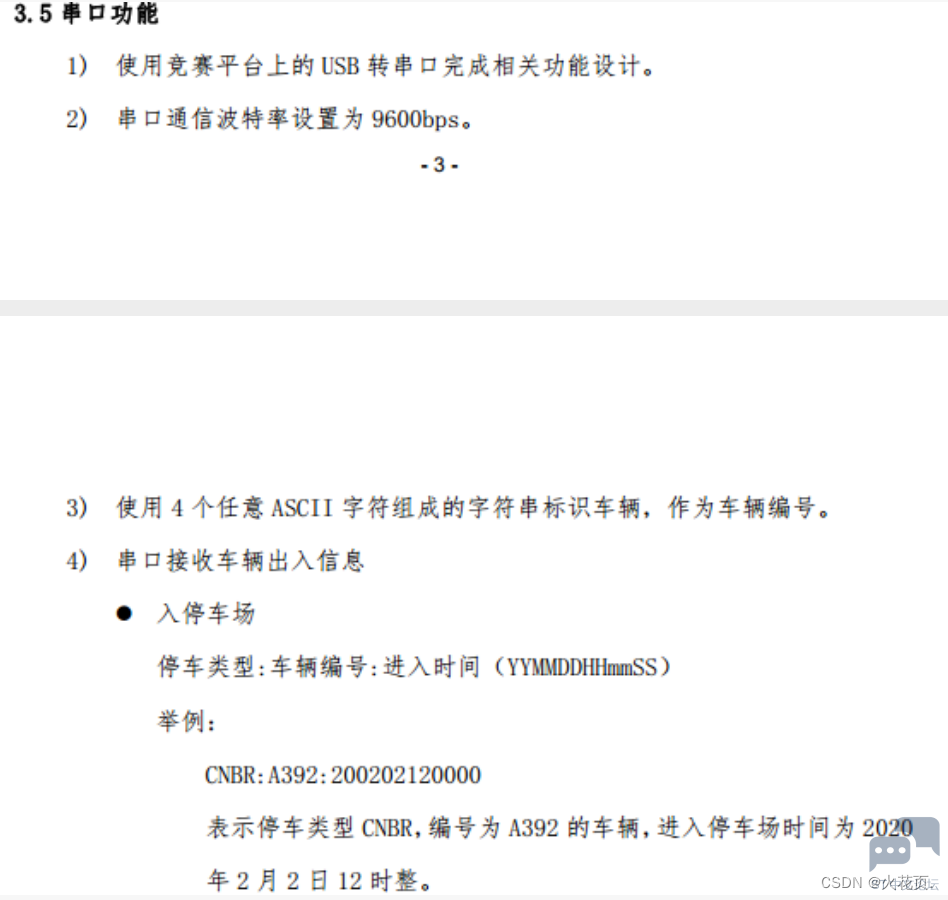
UART
1.原理图以及配置元素
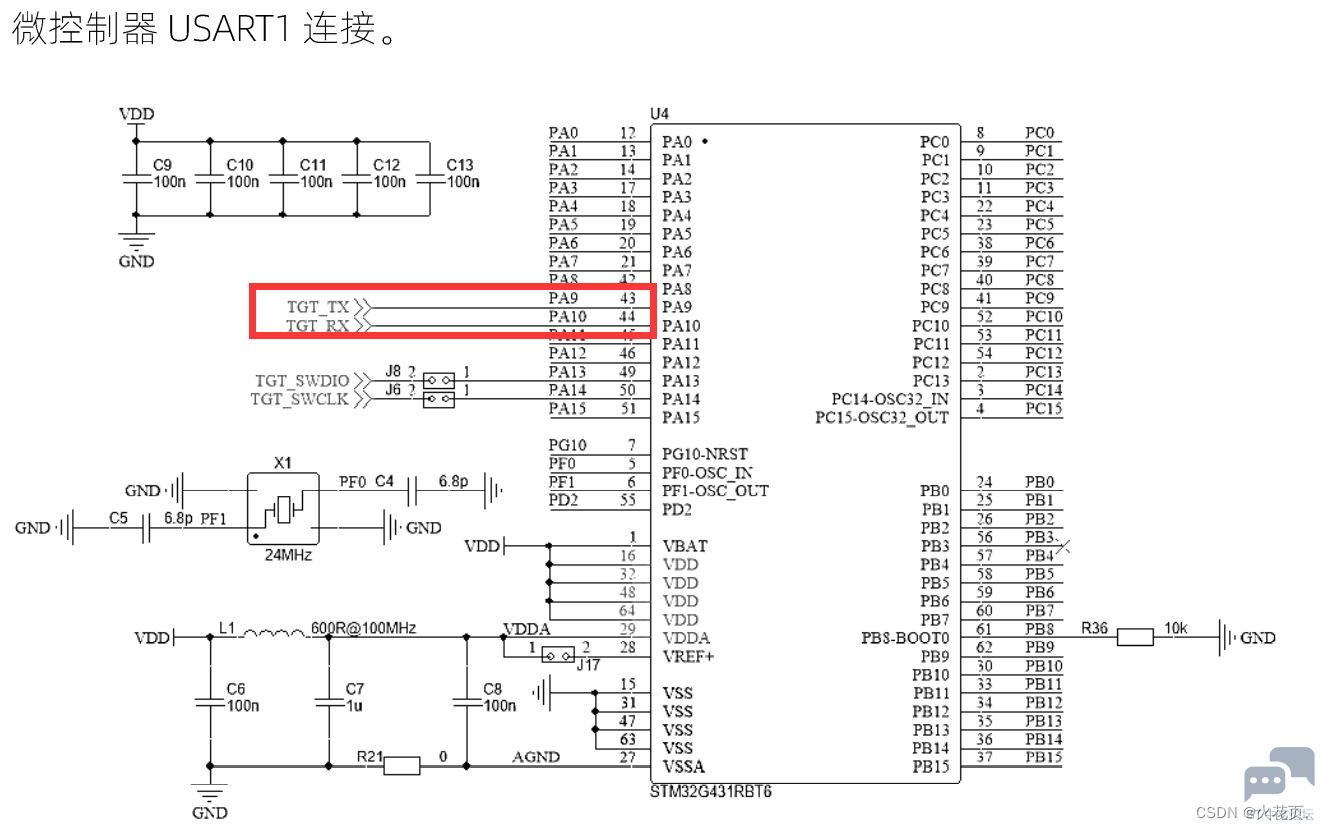
分析:由图可知PA9为串口的TX端,PA10为串口的RX端。
2.CubeMx的配置步骤
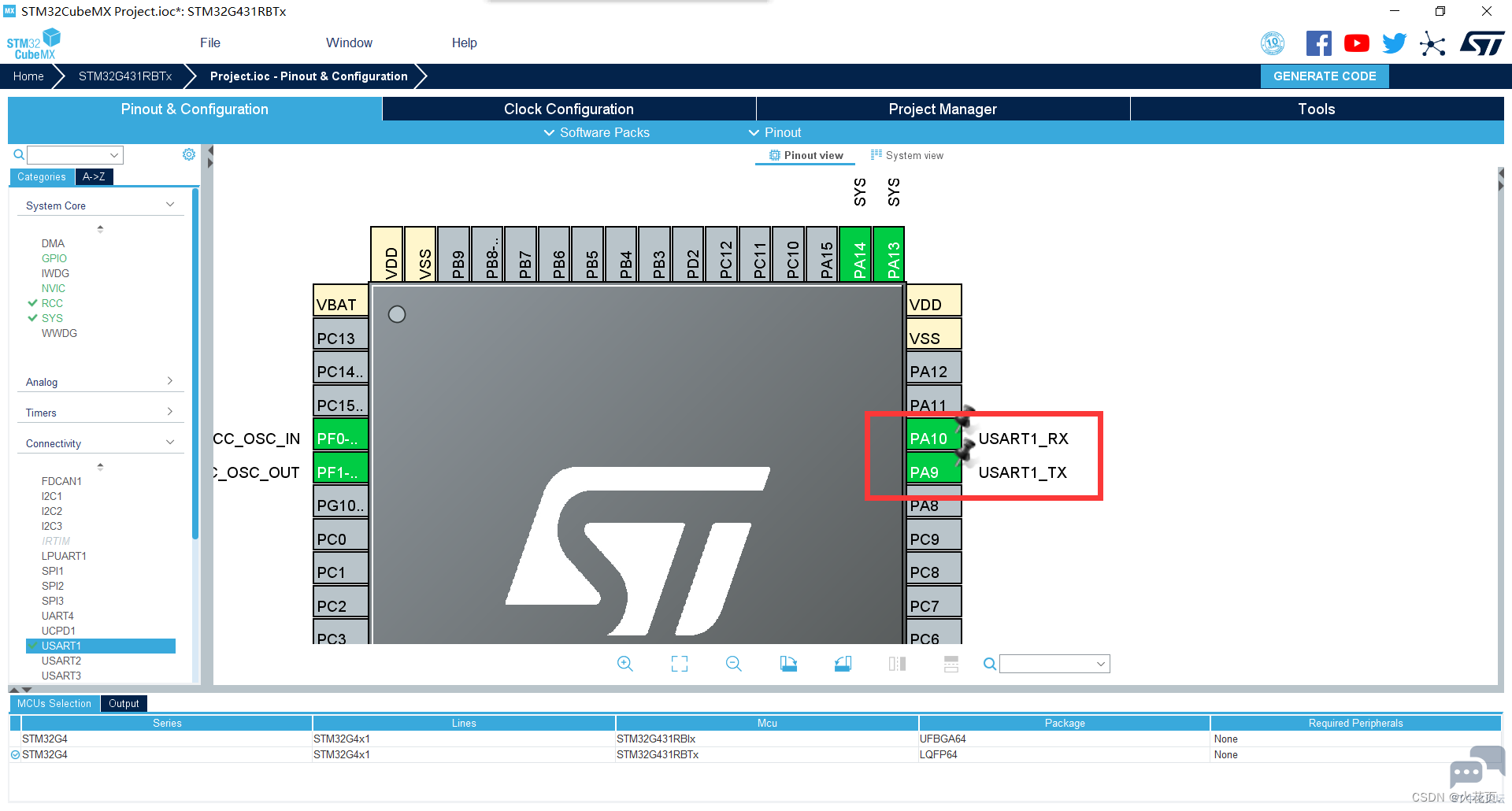
配置两个引脚为红框中的模式,一定要先配置引脚模式再激活串口1,否则当你没有选定PC4与PC5的模式时,串口1激活时会默认选中PC4和PC5为TX端和RX端。
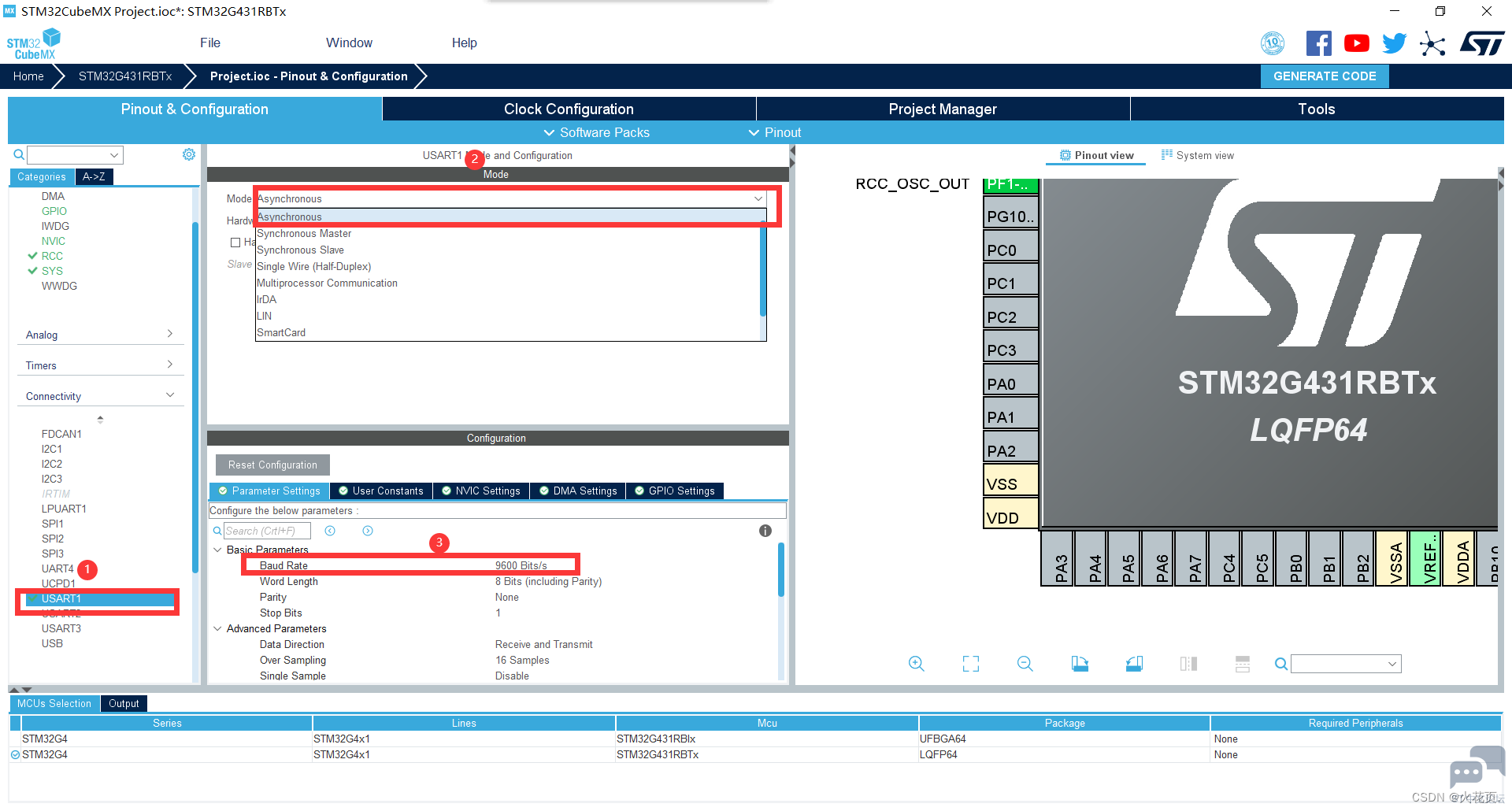
配置号PA9和PA10之后,激活串口1(题目要求波特率为9600)。
3.生成工程
点击GENERATE CODE生成代码后点击Open Project即可。
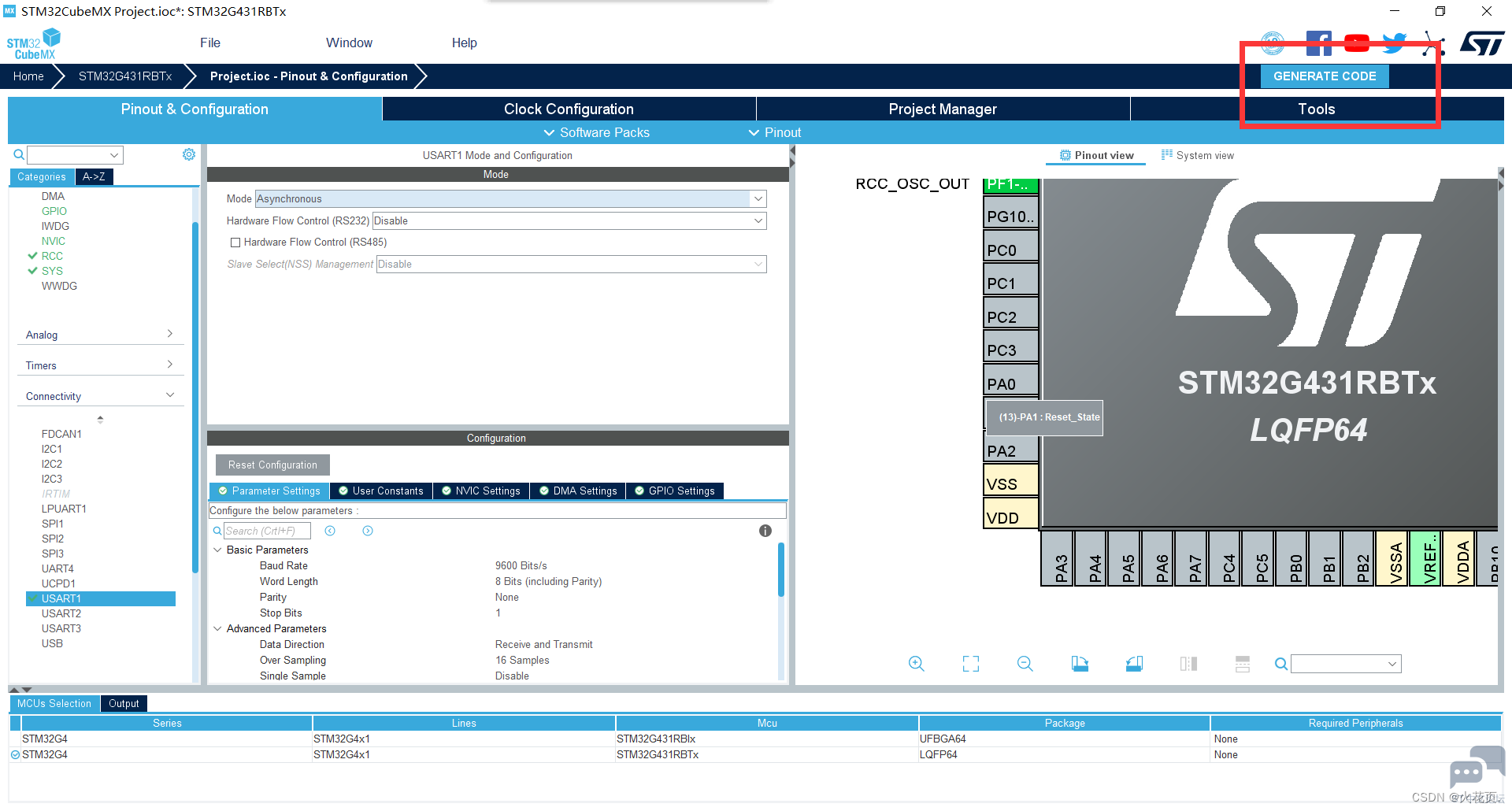
4.测试代码
interrupt.h:
- #ifndef __INTERRUPT_H__
- #define __INTERRUPT_H__
- #include "main.h"
- void HAL_UART_RxCpltCallback(UART_HandleTypeDef *huart);
- #endif
interrupt.c
- #include "interrupt.h"
- #include "usart.h"
- char RxBuffer[30];
- unsigned char BufIndex = 0;
- unsigned char Rxdat = 0;
- void HAL_UART_RxCpltCallback(UART_HandleTypeDef *huart)
- {
- if(huart->Instance == USART1)
- {
- RxBuffer[BufIndex++] = Rxdat;
- HAL_UART_Receive_IT(&huart1, &Rxdat, 1);
- }
- }
main.c:
- /* USER CODE BEGIN Header */
- /**
- ******************************************************************************
- * @file : main.c
- * @brief : Main program body
- ******************************************************************************
- * @attention
- *
- * <h2><center>© Copyright (c) 2023 STMicroelectronics.
- * All rights reserved.</center></h2>
- *
- * This software component is licensed by ST under BSD 3-Clause license,
- * the "License"; You may not use this file except in compliance with the
- * License. You may obtain a copy of the License at:
- * opensource.org/licenses/BSD-3-Clause
- *
- ******************************************************************************
- */
- /* USER CODE END Header */
- /* Includes ------------------------------------------------------------------*/
- #include "main.h"
- #include "usart.h"
- #include "gpio.h"
- /* Private includes ----------------------------------------------------------*/
- /* USER CODE BEGIN Includes */
- #include "stdlib.h"
- #include "stdio.h"
- #include "string.h"
- #include "interrupt.h"
- #include "lcd.h"
- /* USER CODE END Includes */
- /* Private typedef -----------------------------------------------------------*/
- /* USER CODE BEGIN PTD */
- /* USER CODE END PTD */
- /* Private define ------------------------------------------------------------*/
- /* USER CODE BEGIN PD */
- /* USER CODE END PD */
- /* Private macro -------------------------------------------------------------*/
- /* USER CODE BEGIN PM */
- /* USER CODE END PM */
- /* Private variables ---------------------------------------------------------*/
- /* USER CODE BEGIN PV */
- extern unsigned char BufIndex;
- extern char RxBuffer[30];
- extern unsigned char Rxdat;
- /* USER CODE END PV */
- /* Private function prototypes -----------------------------------------------*/
- void SystemClock_Config(void);
- /* USER CODE BEGIN PFP */
- void Rx_Proc(void);
- /* USER CODE END PFP */
- /* Private user code ---------------------------------------------------------*/
- /* USER CODE BEGIN 0 */
- /* USER CODE END 0 */
- /**
- * @brief The application entry point.
- * @retval int
- */
- int main(void)
- {
- /* USER CODE BEGIN 1 */
- /* USER CODE END 1 */
- /* MCU Configuration--------------------------------------------------------*/
- /* Reset of all peripherals, Initializes the Flash interface and the Systick. */
- HAL_Init();
- /* USER CODE BEGIN Init */
- /* USER CODE END Init */
- /* Configure the system clock */
- SystemClock_Config();
- /* USER CODE BEGIN SysInit */
- /* USER CODE END SysInit */
- /* Initialize all configured peripherals */
- MX_GPIO_Init();
- MX_USART1_UART_Init();
- /* USER CODE BEGIN 2 */
- LCD_Init();
- LCD_Clear(Black);
- LCD_SetBackColor(Black);
- LCD_SetTextColor(White);
- HAL_UART_Receive_IT(&huart1, &Rxdat, 1);
- /* USER CODE END 2 */
- /* Infinite loop */
- /* USER CODE BEGIN WHILE */
- while (1)
- {
- /* USER CODE END WHILE */
- /* USER CODE BEGIN 3 */
- if(BufIndex != 0)
- {
- unsigned char temp = BufIndex;
- HAL_Delay(1);
- if(BufIndex == temp)
- Rx_Proc();
- }
- }
- /* USER CODE END 3 */
- }
- /**
- * @brief System Clock Configuration
- * @retval None
- */
- void SystemClock_Config(void)
- {
- RCC_OscInitTypeDef RCC_OscInitStruct = {0};
- RCC_ClkInitTypeDef RCC_ClkInitStruct = {0};
- RCC_PeriphCLKInitTypeDef PeriphClkInit = {0};
- /** Configure the main internal regulator output voltage
- */
- HAL_PWREx_ControlVoltageScaling(PWR_REGULATOR_VOLTAGE_SCALE1);
- /** Initializes the RCC Oscillators according to the specified parameters
- * in the RCC_OscInitTypeDef structure.
- */
- RCC_OscInitStruct.OscillatorType = RCC_OSCILLATORTYPE_HSE;
- RCC_OscInitStruct.HSEState = RCC_HSE_ON;
- RCC_OscInitStruct.PLL.PLLState = RCC_PLL_ON;
- RCC_OscInitStruct.PLL.PLLSource = RCC_PLLSOURCE_HSE;
- RCC_OscInitStruct.PLL.PLLM = RCC_PLLM_DIV3;
- RCC_OscInitStruct.PLL.PLLN = 20;
- RCC_OscInitStruct.PLL.PLLP = RCC_PLLP_DIV2;
- RCC_OscInitStruct.PLL.PLLQ = RCC_PLLQ_DIV2;
- RCC_OscInitStruct.PLL.PLLR = RCC_PLLR_DIV2;
- if (HAL_RCC_OscConfig(&RCC_OscInitStruct) != HAL_OK)
- {
- Error_Handler();
- }
- /** Initializes the CPU, AHB and APB buses clocks
- */
- RCC_ClkInitStruct.ClockType = RCC_CLOCKTYPE_HCLK|RCC_CLOCKTYPE_SYSCLK
- |RCC_CLOCKTYPE_PCLK1|RCC_CLOCKTYPE_PCLK2;
- RCC_ClkInitStruct.SYSCLKSource = RCC_SYSCLKSOURCE_PLLCLK;
- RCC_ClkInitStruct.AHBCLKDivider = RCC_SYSCLK_DIV1;
- RCC_ClkInitStruct.APB1CLKDivider = RCC_HCLK_DIV1;
- RCC_ClkInitStruct.APB2CLKDivider = RCC_HCLK_DIV1;
- if (HAL_RCC_ClockConfig(&RCC_ClkInitStruct, FLASH_LATENCY_2) != HAL_OK)
- {
- Error_Handler();
- }
- /** Initializes the peripherals clocks
- */
- PeriphClkInit.PeriphClockSelection = RCC_PERIPHCLK_USART1;
- PeriphClkInit.Usart1ClockSelection = RCC_USART1CLKSOURCE_PCLK2;
- if (HAL_RCCEx_PeriphCLKConfig(&PeriphClkInit) != HAL_OK)
- {
- Error_Handler();
- }
- }
- /* USER CODE BEGIN 4 */
- int fputc(int ch, FILE *f)
- {
- HAL_UART_Transmit(&huart1, (unsigned char *)&ch, 1, HAL_MAX_DELAY);
- return ch;
- }
- void Rx_Proc(void)
- {
- if(BufIndex == 22)
- {
- char car_type[5];
- char car_data[5];
- char car_time[13];
- sscanf(RxBuffer, "%4s:%4s:%12s", car_type, car_data, car_time);
- LCD_DisplayStringLine(Line0, (unsigned char*)car_type);
- LCD_DisplayStringLine(Line1, (unsigned char*)car_data);
- LCD_DisplayStringLine(Line2, (unsigned char*)car_time);
- }
- else
- {
- printf("Error\n");
- }
- BufIndex = 0;
- memset(RxBuffer, 0, 30);
- }
- /* USER CODE END 4 */
- /**
- * @brief This function is executed in case of error occurrence.
- * @retval None
- */
- void Error_Handler(void)
- {
- /* USER CODE BEGIN Error_Handler_Debug */
- /* User can add his own implementation to report the HAL error return state */
- __disable_irq();
- while (1)
- {
- }
- /* USER CODE END Error_Handler_Debug */
- }
- #ifdef USE_FULL_ASSERT
- /**
- * @brief Reports the name of the source file and the source line number
- * where the assert_param error has occurred.
- * @param file: pointer to the source file name
- * @param line: assert_param error line source number
- * @retval None
- */
- void assert_failed(uint8_t *file, uint32_t line)
- {
- /* USER CODE BEGIN 6 */
- /* User can add his own implementation to report the file name and line number,
- ex: printf("Wrong parameters value: file %s on line %d\r\n", file, line) */
- /* USER CODE END 6 */
- }
- #endif /* USE_FULL_ASSERT */
- /************************ (C) COPYRIGHT STMicroelectronics *****END OF FILE****/
————————————————
版权声明:火花页.
|

.png) STMCU小助手
发布时间:2023-3-1 21:21
STMCU小助手
发布时间:2023-3-1 21:21





 微信公众号
微信公众号
 手机版
手机版
